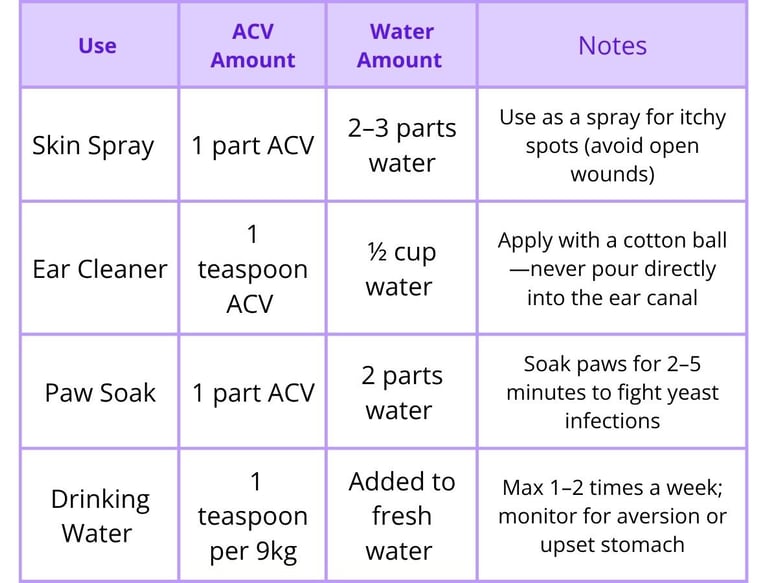Disclosure: Some ads may contain affiliate links. I may earn a commission if you make a purchase, at no extra cost to you.
Apple Cider Vinegar for Dogs: Benefits, Uses, and Safety Tips Every Pet Owner Should Know
Discover how to safely use apple cider vinegar for dogs—learn benefits for skin, digestion, ear care & more. Vet-approved tips & what to avoid.
PET WELLBEINGPET HEALTH
Meo
6/14/20253 min read


Apple Cider Vinegar for Dogs: Benefits, Uses, and Safety Tips Every Pet Owner Should Know
Apple cider vinegar (ACV) isn’t just a pantry staple for humans—it’s also gained popularity as a natural remedy for dogs. From soothing itchy skin to supporting digestion, many pet owners swear by its benefits. But is it safe? And when should you use it?
In this blog, we’ll cover:
✔ Potential benefits of ACV for dogs
✔ Safe ways to use it
✔ When to avoid it
✔ How to introduce it properly
Note: Always consult your veterinarian before introducing any new supplement or remedy to your pet’s routine.
Let’s dive in!
Possible Benefits of Apple Cider Vinegar for Dogs
1. Skin & Coat Health
ACV’s antifungal and antibacterial properties may help with:
Hot spots & itchy skin (diluted ACV can be applied as a spray)
Yeast infections (especially in paws and ears)
Flea repellent (though not a replacement for vet-approved prevention)
2. Digestive Support
Small amounts of ACV in water may:
Aid digestion by promoting healthy gut bacteria
Reduce gas or bloating
Help with minor tummy upsets (always check with your vet first for persistent issues)
3. Urinary Tract Health
Some believe ACV can balance pH levels, potentially reducing the risk of UTIs—though scientific evidence is limited. One pet parent shared their success using ACV mixed with cooled green tea and a tsp of honey when conventional antibiotics weren’t working. However, always consult your vet before using home remedies for infections.
4. Ear Cleaning Solution
A diluted ACV rinse can help clean ears and prevent yeast buildup, but never use it if your dog has open sores or a severe infection.
How to Use Apple Cider Vinegar Safely
Choosing the Right ACV
Always use raw, unfiltered, organic apple cider vinegar (like Bragg’s) with the "mother"—the cloudy sediment containing beneficial enzymes.
Dilution is Key!
ACV is highly acidic and must be diluted to avoid irritation:
For skin applications: Mix 1 part ACV with 2-3 parts water.
For drinking water: Add 1 teaspoon per 20 lbs of body weight to their bowl (max 1-2 times per week).
Ways to Use It
✅ Itchy skin relief – Spray diluted ACV on problem areas (avoid open wounds).
✅ Paw soak – Mix ACV with water for an antifungal paw rinse.
✅ Ear cleaner – 1 tsp ACV + ½ cup water; apply with a cotton ball (never pour directly into the ear canal).
✅ Digestive boost – Occasionally add a small amount to food or water.
📊 Apple Cider Vinegar Dilution Guide for Dogs
(See visual chart below for safe dilution ratios.)
When to Avoid Apple Cider Vinegar
While ACV can be helpful, it’s not suitable for every dog. Avoid it if your dog has:
❌ Open wounds or raw skin (it will sting!)
❌ Kidney disease or ulcers (acidity can worsen these conditions)
❌ Allergies to vinegar (rare, but possible)
❌ A history of pancreatitis (consult your vet first)
Quick Tips:
Always use raw, unfiltered ACV with "the mother"
Never use ACV undiluted on skin or in ears
Do a patch test before regular use
If your dog dislikes the taste or smell, it’s okay to skip it—reducing stress is more important than forcing a remedy.
Final Verdict: Should You Try ACV for Your Dog?
Apple cider vinegar can be a handy, natural supplement for minor issues, but it’s not a cure-all. Always:
Patch-test diluted ACV on a small skin area first.
Monitor for reactions (excessive licking, vomiting, or discomfort means stop use).
Ask your vet before using ACV if your dog has health conditions.
Used wisely, ACV might just become your pup’s new favorite home remedy!
Have you tried ACV for your dog? Let us know in the comments below!



Meo's world
<--Awin verification 001-->
Bark
Fetch
meosworld@yahoo.com
© Meo's World 2025. All rights reserved.
